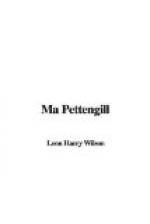The crafty wretch! He could wake up in the night and put his hand on those keys in the dark. Probably he often done so. I spoke a few simple words of praise for his sagacity. And after this interesting lecture on his trunk and its keys, and a good look at the accurate layout of his one million belongings, I had his number. He was the oldest living boy scout.
And this poor girl with the designful eyes on him was the oldest living debutante. I learned afterward that the great aim of science is classification. I had these two classified in no time, like I’d been pottering away at science all my life. Why, say, this Oswald person even carried a patent cigar lighter that worked! You must of seen hundreds of them nickel things that men pay money for. They work fine in the store where you buy ’em. But did you ever see one work after the man got it outside, where he needed it? The owner of one always takes it out, looking strained and nervous, and presses the spring; and nothing happens except that he swears and borrows a match. But Oswald’s worked every time. It was uncanny! Only a boy scout could of done it.
So they got settled and the field work begun next day. The two men would ride off early to a place about five miles north of here that used to be an ancient lake—so I was told. I don’t know whether it did or not. It’s dry enough now. It certainly can’t be considered any part of our present water supply. They would take spades and hammers and magnifying glasses and fountain pens, and Oswald’s cigar lighter and some lunch, and come back at night with a fine mess of these here trilobites and vertebrae; and ganoids and petrified horseflies, and I don’t know what all; mebbe oyster shells, or the footprints of a bird left in solid rock, or the outlines of starfish, or a shrimp that was fifty-two million years old and perfectly useless.
They seemed to have a good time. And Oswald would set up late writing remarks about the petrified game they had brought in.
I didn’t used to see much of ’em, except at night when we’d gather for the evening meal. But their talk at those times did wonders for me. All about the aims of science and how we got here and what of it. The Prof was a bulky old boy, with long gray hair and long black eyebrows, and the habit of prevailing in argument. Him and Oswald never did agree on anything in my hearing, except the Chink’s corn muffins; and they looked kind of mad at each other when they had to agree on them.
Take the age of this earth on which we make our living. They never got within a couple of hundred million years of each other. Oswald was strong for the earth’s being exactly fifty-seven million years old. Trust him to have it down fine! And the old man hung out for four hundred million. They used to get all fussed up about this.
They quoted authorities. One scientist had figured close and found it was fifty-six million years. And another, who seemed to be a headliner in the world of science, said it was between twenty million and four hundred million, with a probability of its being ninety-eight million. I kind of liked that scientist. He seemed so human, like a woman in a bean-guessing contest at the county fair. But still another scientist had horned in with a guess of five hundred million years, which was at least easy to remember.




